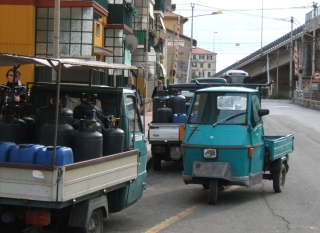Just as there are many things about English life that a foreigner would find amusing or strange, here in Italy we remark upon many things that grab our attention for what we regard as their novelty.
There is a commonly seen vehicle that to our English eyes looks like something recovered from a second World War film set but which in reality is the workhorse of many small local businesses. It comes in various forms, all of which are known as 'Ape' (pronounced 'appay'), the Italian word for 'bee', has three small wheels and a tiny 50cc engine which buzzes, under load, just like the insect whose name it carries. Blue seems to be the favourite colour for these ubiquitous vehicles which are steered from inside the tiny cab, either with a wheel or handlebars, depending upon vintage, I assume.
That might be the end of the story but for the fact that there is a vehicle, much more well known in Britain, that has been named after another insect, the wasp.
The Vespa motor-scooter needs no introduction to me as I can recall years as a self-possessed teenager posing on similar vehicles trying to catch the eye of some passing lovely and I am sure that present-day young men all over the world still ride these machines without realising the meaning of the name in Italian. Again the name must surely derive from the similarity of the engine noise to that of the insect in flight.
The Vespa motor-scooter needs no introduction to me as I can recall years as a self-possessed teenager posing on similar vehicles trying to catch the eye of some passing lovely and I am sure that present-day young men all over the world still ride these machines without realising the meaning of the name in Italian. Again the name must surely derive from the similarity of the engine noise to that of the insect in flight.
Rather louder but sticking to the transport theme we move on up the scale to the tractor, and here we thought we were on comfortable ground until we saw the local version of this vehicle, a single-cylinder diesel engine, often with a furiously spinning, unprotected flywheel protruding from the front, a narrow wheelbase and a small cart on the back.
With four-wheel drive this beast is completely suited to the land it lives on. It can pass along narrow village streets, climb twisting mountain roads, carry loads far heavier than might be supposed and will come to no harm if left out in all weathers. It is perfect for our French friend, Guy who takes us up to his olive trees, 300 metres up the mountainside, so we can help with the harvest. Anything bigger would block the road or possibly cause a landslide as it negotiated the hairpin bends. Sadly, despite the racket the engine makes, now a familiar noise to us, the Italians have yet to come up with an insect to name this after.
With four-wheel drive this beast is completely suited to the land it lives on. It can pass along narrow village streets, climb twisting mountain roads, carry loads far heavier than might be supposed and will come to no harm if left out in all weathers. It is perfect for our French friend, Guy who takes us up to his olive trees, 300 metres up the mountainside, so we can help with the harvest. Anything bigger would block the road or possibly cause a landslide as it negotiated the hairpin bends. Sadly, despite the racket the engine makes, now a familiar noise to us, the Italians have yet to come up with an insect to name this after.
They say the Italians are a passionate nation, not something I am qualified to comment on, but the three black beetles acting out this little scene beside a footpath leading up out of Torri, made us think that there might be something about the sun or the air here that promotes coleopteran promiscuity. We were on an afternoon walk up a tiny valley to find the original source of water supplied to our village before mains-purification came along and were following a rough track balanced precariously on the steep hillside. The upper valley narrowed to almost nothing and the stream fell over a short waterfall, above which there was lush vegetation and a small clear pool, a secret place enclosed within headwalls of rocky crags above. Even in this wild isolated place there is evidence of man's intervention, retaining walls still standing here and there trying to keep the land in place, preventing the fragile soil from washing away so that olives could be grown. The vegetation is mostly green but here and there a striking splash of yellow-orange catches the eye, a deciduous tree succumbing to the shortening days of late Autumn.





No comments:
Post a Comment